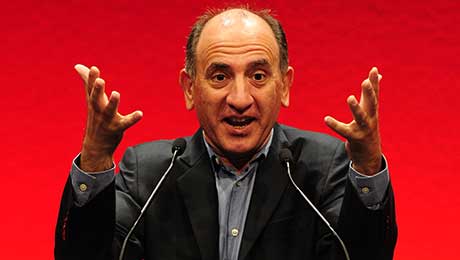Iannucci takes government to task

Armando Iannucci delivering this year’s MacTaggart Lecture
GEITF: The writer behind The Thick of It and Veep has attacked the UK government for trying to curtail the BBC and said the nation’s “greatest network” needs protection now more than ever.
Armando Iannucci used the MacTaggart Lecture at this year’s Guardian Edinburgh International Television Festival, which kicked off today, to attack the way in which the Conservative party has handled the process of BBC charter renewal since being elected in May.
The political satirist, who has written for the UK pubcaster as well as Channel 4, Sky Atlantic and HBO, said that while television is currently enjoying a “golden age,” a “cacophony” of user-generated content means the need for high-quality programming has never been higher.
“It’s more important than ever that we have strong, popular channels, highly respected for their quality, that act as beacons, drawing audiences to the best content available and providing a confident home for the best programme-makers,” said Iannucci.
“Faced with a global audience now, British television needs its champion supporters, it needs its cheerleaders.”
He accused the UK government of failing in this regard, adding that politicians are consistently talking of “reining in our greatest network.”
Iannucci pointed the finger at chancellor George Osborne, whom he dubbed “Prime Minister Regent” and whose “We’re All in This Together” slogan for economic austerity he borrowed as the title of his speech.
“Our friends in Whitehall would argue that, as the BBC’s charter comes up for renewal, it’s important to see how the corporation can operate even more effectively,” he said.
Referring to the shotgun deal that saw the BBC take on responsibility for funding free TV licenses to over-75s, Iannucci said: “I’d argue back that starting a debate on how the BBC should be funded just days after lopping 20% off its budget without discussion seems pretty much to me like shutting the stable door after the horse has been bolt-gunned.”
He added that if public service broadcasting – which he described as “one of the best things we’ve ever done creatively as a country” – were the car industry, ministers would be “championing it overseas, trying to win contracts, boasting of the British jobs that would bring.”
“If the BBC were a weapons system, half the Cabinet would be on a plane to Saudi Arabia to tell them how brilliant it was,” he said. “And yet it’s quite the reverse. They talk of cutting down to size, of reining in imperialist ambitions, of hiving off, of limiting the scope, with all the manic glee of a doctor urging his patient to consider the benefits of assisted suicide.”
Iannucci turned the screw on secretary of state for culture, media and sport John Whittingdale MP for flip-flopping over his position on BBC primetime entertainment shows such as Strictly Come Dancing and the “one-sided nature” of the panel of experts he appointed last month to consider the BBC’s future.
“What worries me is that a) politicians now intend to act on their extremely subjective opinions and b) they are increasingly falling into the trap of thinking that because they have won a parliamentary majority, they know how a majority of the public thinks. It’s a dangerous path, a creeping imperial ambition that’s doing international harm to our stock,” said Iannucci.
Citing overseas perceptions of BBC cuts and murmurs of Channel 4 being privatised, Iannucci said the question he is repeatedly asked by people in the US TV industry is: “What the hell are you guys thinking?”
He added: “To them it looks like we’re going mad. This is toxifying something that could otherwise make more money internationally. Simply put, it’s bad capitalism.”
The Scot said that the biggest surprise for him about working in the US for HBO, for which he created Veep, was how familiar it felt.
“It’s quite a small, tight unit where I only had to deal with one, sometimes two, executives. They placed the creative voice front and centre of what they did,” he said. “That’s exactly how the BBC worked some 15, maybe 10 years ago. The best US shows are modelling themselves on what used to make British TV so world-beating.”
He added that the best US dramas were those that had “taken a leaf out of the British playbook: limiting their runs to 13 episodes a season or even, with shows like Game of Thrones or True Detective, 10.”
Earlier in the day, Whittingdale told delegates: “Nobody is talking about dismantling the BBC. This idea that there is an ideological drive to destroy the BBC is just extraordinary.”
BBC director of television Danny Cohen welcomed his comments as “encouraging” and said they said they struck a “conciliatory tone”, having on the eve of the festival defended the pubcaster’s position.
Iannucci seemed to support one proposal up for discussion – that of privatising the pubcaster’s commercial arm BBC Worldwide.
“If the licence fee is under strain, then let’s supplement it, not carve it up, by pushing ourselves more commercially abroad. Use the BBC’s name, one of the most recognised brands in the world, and use the reputation of British Television across all networks, to capitalise financially overseas, be more aggressive in selling our shows, through advertising, through proper international subscription channels, freeing up BBC Worldwide to be fully commercial,” he said.
“Protect public service broadcasting at home by displaying the arrogance of our convictions abroad.”












.jpg)




























